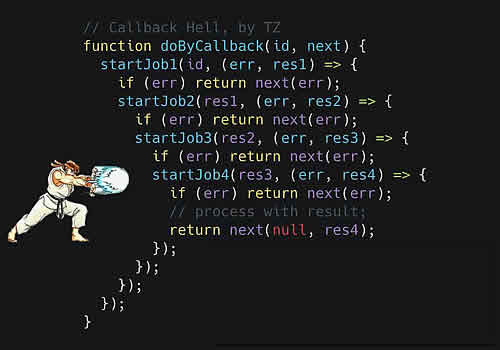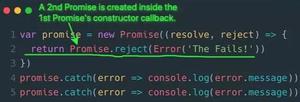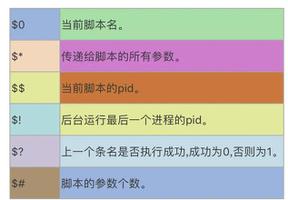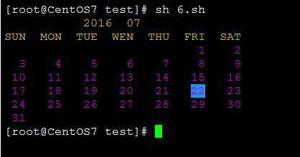Promise 和 Async / Await 的介绍
1. Promise 是为了解决什么问题?
解决了回调地狱 Callback Hell 的问题。
回调地狱的问题并不只是在于缩进太多(如下图),至少在阅读如下代码的时候不会有什么障碍。

1. 难于理解
真正的问题在于逻辑难于理解,如下图代码中,我们假定形如 doSomething 的调用又涉及到一步调用,那么阅读的人可能会需要把调用顺序记在脑袋里才行。
listen( "click", function handler(evt){ doSomething1();
doSomething2();
doSomething3();
doSomething4();
setTimeout( function request(){
doSomething8();
doSomething9();
doSomething10();
ajax( "http:// some. url. 1", function response( text){
if (text == "hello") {
handler();
} else if (text == "world") {
request();
}
});
doSomething11();
doSomething12();
doSomething13();
}, 500);
doSomething5();
doSomething6();
doSomething7();
});
相比较起来,如下的一个使用 Promise 包装的例子就很简洁,其关键点在于 Promise 的构造函数中,只负责成功/失败的通知,而后续的操作放在了 then 中
const getJSON = function(url) { const promise = new Promise(function(resolve, reject){
const handler = function() {
if (this.readyState !== 4) {
return;
}
if (this.status === 200) {
resolve(this.response);
} else {
reject(new Error(this.statusText));
}
};
const client = new XMLHttpRequest();
client.open("GET", url);
client.onreadystatechange = handler;
client.responseType = "json";
client.setRequestHeader("Accept", "application/json");
client.send();
});
return promise;
};
getJSON("/posts.json").then(function(json) {
console.log('Contents: ' + json);
}, function(error) {
console.error('出错了', error);
});
2. 信任问题
经过 Promise 流程的调用,将同步调用放在 then 中就不会出现同步调用意外的早于异步调用的情况;而且 Promise 的结果不能被篡改,多次调用的回调结果都能保持一致。
2. 如何模拟实现 Promise
let status = 'pending';class Promise {
constructor(func){
func(this._resolve.bind(this), this._reject.bind(this))
}
_resolve() {
status = 'fullfilled';
}
_reject() {
status = 'rejected';
}
then(succCallback, failCallback) {
if(status == 'pending') {
this.succCbList.push(succCallback);
this.failCbList.push(failCallback);
} else if(status== 'fullfilled'){
succCbList.forEach(f => {f();})
} else {
failCallback.forEach(f => {f();})
}
}
}
3. 实际的应用场景
service.interceptors.response.use(
response => {
const res = response.data;
if (res.status == 10101 || res.status == 401) {
G.U.clearCookie()
G.U.removeCookie('token', document.domain)
G.U.removeCookie('token', G.U.getTopDomain())
Message.error({
message: res.message || '未授权用户,即将跳转到登录界面',
duration: 2 * 1000
})
setTimeout(() => {
window.location.href = '/login.html'
}, 2000)
} else if (res.status == 404) {
Message.error({
message: res.message || '请求找不到',
duration: 5 * 1000
})
} else if (res.status == 500 || res.status == 503) {
Message.error({
message: res.message || '服务器错误',
duration: 5 * 1000
})
} else if (G.U.isBlob(res)) {
// do nothing
} else if (res.status != 0) {
Message.error({
message: res.message || res.errorMessage || '未知异常',
duration: 5 * 1000
})
}
return response.data
},
error => {
Message.error({
message: error.message,
duration: 5 * 1000
})
}
)
service.interceptors.response.use( response => {
const res = response.data;
let message;
return new Promise((resolve, reject) => {
if (res.status == 10101 || res.status == 401) {
G.U.clearCookie()
G.U.removeCookie('token', document.domain)
G.U.removeCookie('token', G.U.getTopDomain())
setTimeout(() => { window.location.href = '/login.html' }, 2000)
message = res.message || '未授权用户,即将跳转到登录界面';
} else if (res.status == 404) {
message = res.message || '请求找不到';
} else if (res.status == 500 || res.status == 503) {
message = res.message || '服务器错误';
} else if (G.U.isBlob(res)) {
// do nothing
} else if (res.status != 0) {
message = res.message || res.errorMessage || '未知异常'
}
if(message != undefined) {
reject(message);
Message.error({ message, duration: 3 * 1000 })
} else {
resolve(response.data);
}
});
},
error => {
Message.error({ message: error.message, duration: 5 * 1000 })
return Promise.reject(error.message)
}
)
返回的 Promise 对象,可以让调用的位置,按照 Promise 的缘分书写 then/catch。下面是来自 components/activity/view.vue 使用 Promise 改写后的代码,后者看看起来更简洁:
methods: { queryAuditStatus(id){
G.R.Common.getAuditProgress('ACTIVITY_AUDIT', id).then(resp => {
if(resp.status == 0) {
this.processData = resp.data;
}
})
}
},
mounted() {
G.R.Product.getActivityDetail(params.id).then(resp => {
if(resp.status == 0 && resp.data) {
this.product = Activity.parse(resp.data);
this.queryAuditStatus(params.id);
} else{
this.$message({
type:'info',
message:resp.message
})
}
this.loading = false;
})
}
let id = G.U.getParam('id', this);this.loading = true;
G.R.Product.getActivityDetail(id).then(resp => {
this.product = Activity.parse(resp.data || {});
return G.R.Common.getAuditProgress('ACTIVITY_AUDIT', id);
}).then(resp => {
this.processData = resp.data;
}).finally(() => {
this.loading = false;
});
4.Async/Await 的含义和基本用法
1. Generator
可以把 Generator 函数看成是一个状态机,封装了多个内部状态,执行 Generator 函数会返回一个遍历器对象,代表 Generator 函数的内部指针。虽然 Generator 函数是一个普通函数,但是有两个特征:
- function 关键字与函数名之间有一个星号;
- 函数体内部使用 yield 表达式,定义不同的内部状态。
function* helloWorldGenerator() { yield 'hello';
yield 'world';
return 'ending';
}
var hw = helloWorldGenerator();
hw.next()
// { value: 'hello', done: false }
hw.next()
// { value: 'world', done: false }
hw.next()
// { value: 'ending', done: true }
hw.next()
// { value: undefined, done: true }
Async/Await
async 就是 Generator 函数的语法糖。如下是使用 Generator 函数依次读取两个文件的代码:
const fs = require('fs');const readFile = function (fileName) {
return new Promise(function (resolve, reject) {
fs.readFile(fileName, function(error, data) {
if (error) return reject(error);
resolve(data);
});
});
};
const gen = function* () {
const f1 = yield readFile('/etc/fstab');
const f2 = yield readFile('/etc/shells');
console.log(f1.toString());
console.log(f2.toString());
};
使用 async 函数改写后如下,语法上看只是简单地把 * 换成 async,yield 替换成 await 而已。
const asyncReadFile = async function () { const f1 = await readFile('/etc/fstab');
const f2 = await readFile('/etc/shells');
console.log(f1.toString());
console.log(f2.toString());
};
但 async 对 Generator 函数的改进体现在如下四点:
- Generator 必须依靠内置执行器(co 模块)通过 next 语法执行,而 async 函数自带执行器执行起来像普通函数
- 更好的语义,比起 * 和 yield,使用 async 和 await 语义更清楚
- 更广的适用性,yield 命令后面只能是T runk 函数和 Promise 对象,而 async 的 await 后面可以是 Promisee 对象和原始值
- async 函数的返回值是 Promise 对象,比起 Generator 函数的返回值是 Iteretor 方便,可以使用 then 方法指定下一步操作
5. Async/Await 的实际应用
未经过改写的代码
methods: { handlePreview(file) {
this.dialogImageUrl = file.url;
this.dialogVisible = true;
},
queryAuditStatus(id){
G.R.Common.getAuditProgress('ACTIVITY_AUDIT', id).then(resp => {
if(resp.status == 0) {
this.processData = resp.data;
}
})
},
lookProduct(id){
this.$router.push({name:'prod_product_manage_view',params:{id:id}})
}
},
mounted() {
let params = this.$route.params || {};
this.loading = true;
G.R.Product.getActivityDetail(params.id).then(resp => {
console.log(resp)
if(resp.status == 0 && resp.data) {
this.product = Activity.parse(resp.data);
this.queryAuditStatus(params.id);
}else{
this.$message({
type:'info',
message:resp.message
})
}
this.loading = false;
})
let id = {
id:params.id
}
G.R.Product.getActivityOtherDispose(id).then(resp => {
console.log(21321321312312)
console.log(resp)
if(resp.status == 0 && resp.data) {
if(resp.data.length){
this.activityOther = resp.data;
}
}
this.loading = false;
})
}
使用 await 该改写后的代码:
- 代码更少,可读性更好
- 在 loading 的控制上更直接
# /components/activity/view.vue async mounted() {
let params = this.$route.params || {};
let id = params.id;
let activityRes = await G.R.Product.getActivityDetail(id);
let processRes = await G.R.Common.getAuditProgress('ACTIVITY_AUDIT', id);
let otherRes = await G.R.Product.getActivityOtherDispose({id});
this.loading = true;
if(activityRes.ok && processRes.ok && otherRes.ok) {
this.product = Activity.parse(activityRes.data);
this.processData = processRes.data;
if(otherRes.data && otherRes.data.length) {
this.activityOther = otherRes.data;
}
}
this.loading = false;
}
将三个请求改为并行缩短请求时间
# /components/activity/view.vue async mounted() {
...
let [activityRes, processRes, otherRes] = await Promise.all([
G.R.Product.getActivityDetail(id),
G.R.Common.getAuditProgress('ACTIVITY_AUDIT', id),
G.R.Product.getActivityOtherDispose({id})
])
...
}
以上是 Promise 和 Async / Await 的介绍 的全部内容, 来源链接: utcz.com/p/234383.html









